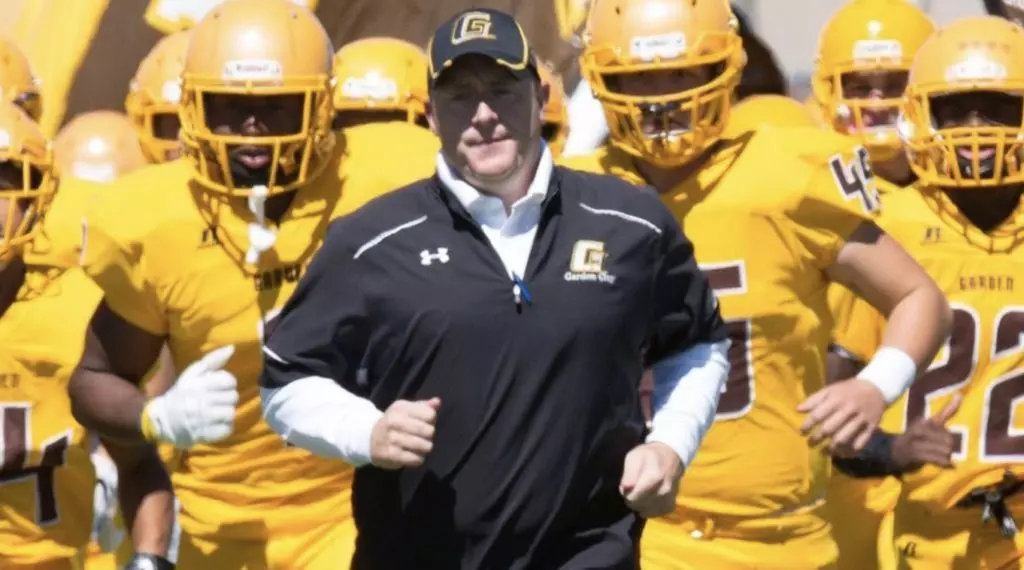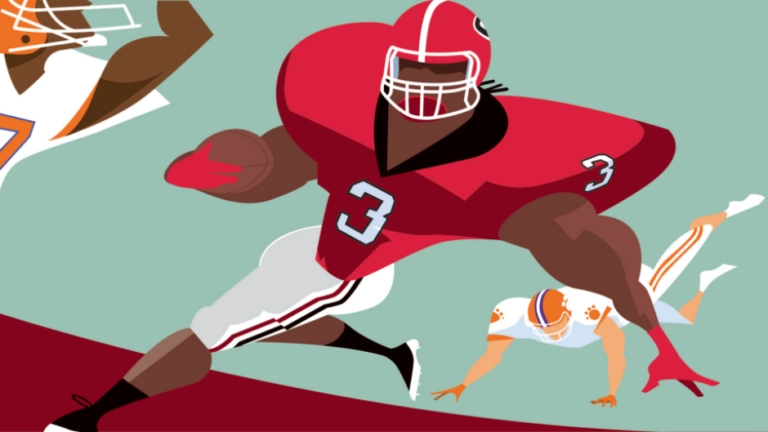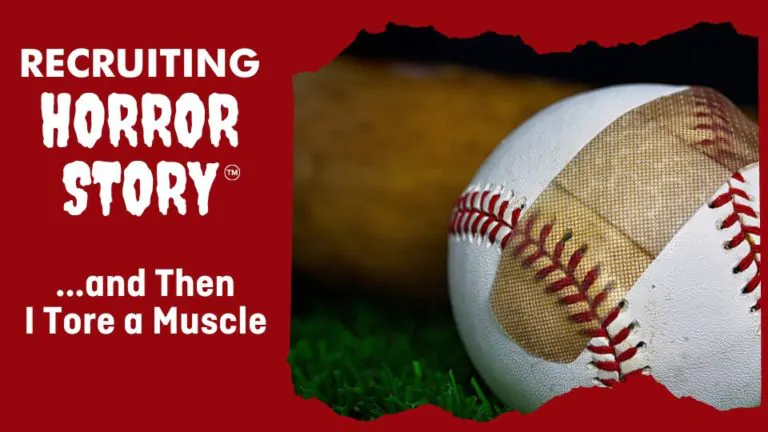Jeffrey Sims, Missouri Southern State University's head football coach, has been nothing short of exceptional throughout his coaching career. Over the course of his head coach tenure in Junior College, he had a record of 77-32 with three national championship appearances. On top of his relentless dominance as a coach, he also holds his team to high academic standards. At his former school, Garden City Community College, as seen on Netflix's Last Chance U, Coach Sims' team consistently had a team GPA of 3.00. In his first season with Missouri Southern State University, his team achieved its highest GPA in nearly a decade.
Amidst the COVID-19 outbreak, Coach Jeffrey Sims took the time to answer some questions as to how athletes across the country should be handling the adjustments made to the recruiting process. Through his vast coaching experience, he also gave valuable insight into the recruiting and evaluation processes.
COVID-19
2aDays: Recently, the NCAA Division I and II council released a statement regarding the recruiting process as a result of the COVID-19 Outbreak. The decision was to declare a dead period until at least April 15th. For those athletes depending on face-to-face interactions with the coaching staff to separate themselves in the recruiting process, as a head coach, what would advise them to do?
Athletics is about competition. This is a good time to separate yourself from the crowd. In 2020, you do not always have to be face-to-face; there are many other ways to communicate, use these methods to work with college recruiters.
2aDays: Many recruits nearing their decisions rely on their Official Visits before finding their home. With official visits off the table until the end of the period, what are some resources athletes can use to learn more about campus?
For football, official visits are not typical this time of year, so at this point, we won't be affected. But if I were an athlete that wasn't allowed to visit, I wouldn't make a decision yet – everyone is in the same boat, when this passes, there will be time to visit your top schools. It may keep some athletes from visiting 15 colleges unofficially, but they will be able to see their top 2 or 3, and if a school won't wait for you, then that wasn't the school for you. One thing I think people really forget in the recruiting process is signing day is the first day you can sign–many act like it's the last.
2aDays: The ACT exam scheduled for April 4th was recently rescheduled to June 13th, and the SAT canceled their tests for May 2nd as well as the makeup for March 14th. With test scores being so vital in the recruiting process, what should be the next steps for recruits depending on those exams?
Turn a negative into a positive and STUDY! If they were moved back, use this time to be ready and get a great score.
2aDays: Coaches across the country, such as LSU's Ed Orgeron, have begun to endorse spring sports, such as track and field. For the spring juniors/seniors who would've needed this season for film or to develop as a player, what do you suggest athletes do in the meantime to remedy this?
The government has asked us to practice social distancing. They have not said at this time you can not go outside and run. Get a workout from your High School Coach, reach out to the local university strength and conditioning coach, and tell him you are looking to train on your own. Does he have a workout he/she would suggest? This will eventually pass, and we all are going through it. Deal with it the best you can, and when we resume, be ready.
Recruiting Process:
2aDays: It is no question; every competitor believes that they can play at the Division I level; however, every journey isn't the same. You have coached at multiple levels of football (JUCO, DII & DI.) What are some of the things that make up a Division I athlete, and what traits help to separate them from their competition?
The thing that separates an NCAA DI athlete from the rest is most of the time length and speed. There are many times in High School, player A will outperform Player B in a game or season, but Player B will have multiple scholarship offers, and the families and fans all wonder why. The reason is recruiting is not about who you are today; it's about whom we can develop you to be in 3-5 years. An athlete that is longer and faster with the correct player development in the years to come can be better. Also, we [teams] play on fields and courts that have a certain dimension – if I put five players 6'5 on the court vs. five players 6' the team with the 6'5 players do not have to cover the same amount of area or jump as high as the team with 6' footers. There are always stories of the player who overachieves, but the percentages in recruiting say go with the longer and faster athletes.
2aDays: For those who aren't an immediate Division I prospect, but would like to continue their journey as a walk-on, how would they navigate that process to gain a competitive edge?
If you are going to walk-on at a Division I school, first, have a plan that is achievable. I have heard of students who say I will walk on for a year, and then if I get a scholarship, I will stay. That is not realistic. The coaches will not even start evaluating you until the spring. The first semester they are focusing on their current games, not freshman walk-ons. Spring semester will be the first time you have a chance to get evaluated, and that will be in [the] 15 practices when you get your chance. Also, there are NCAA rules that affect when they can offer a scholarship. Make sure you are playing a position that they can scholarship you as a walk-on, if you are a QB, the chances are slim, because there are only so many reps at practice. If you are an offensive lineman 6'2 or over, odds are they are going to scholarship you. If you are bound and determined to play Division I football and are going to walk on, make sure these things are in place:
- Make sure you can afford to pay to go to the university if not on scholarship (don't go out of state if you can't pay for out of state)
- If you quit football, you would stay at the university
- The coaches actually know who you are and want you there
- Have your high school coach or principal work with the coaching staff to get you in the program; they are more likely to keep you involved in the program if they have to visit your school every year to recruit
2aDays: What advice would you give players who are thinking about undergoing the redshirt process? Can you briefly explain the redshirting process, and how players can successfully maneuver through this period to optimize their own experience while maintaining a helpful and positive attitude for the team?
The best way to go through redshirting is simple, always prepare as if you are playing and always be ready to play. Leave the decision to redshirt up to the coaching staff and do what is best for your team.
2aDays: Currently, you're the Head Coach at Missouri Southern State University, a Division II school. How is tackling recruiting different in Division II compared to the other Divisions you have coached in? What challenges arise? If at all, how may it cause you to re-evaluate the types of players you recruit?
This is the best question you have asked. All recruits need to understand one thing, ALL LEVELS of football are different, and you need to find the level that is best for you. I have coached at NAIA, JC, DII, Mid-Major DI, Big Ten – they are all completely different. Too many people say they want to be DI but do not have any idea what that means, and too many students end up at the wrong level and have a poor experience. At DII, I have found that it is very important to find students that fit your university, it must be a relationship where both the student-athlete and the football program are on the same page as to what a successful athletic experience is, [so] at the end of their career they received the college-experience they desired by being a part of your Division II program, and they are proud to have been a member.
2aDays: According to the NCAA, 62% of Division II student-athletes receive athletic aid compared to the 59% in Division I. Many athletes may be unaware of statistics such as this, and thus only have one goal; Division I. With Division II institutions being home to many first-generation college students, how do you encourage players to look beyond what they see in the media and consider Division II schools?
It's about finding the students that fit your program ideals. All programs are not the same, as people are not the same. It's essential to find the students who hear the message your program is offering. An easy example is, we are a program that is building. If a student wants to be a part of building a tradition, have an opportunity to play sooner rather than later, we are a school they would consider. If they want to go somewhere that is already established, learn from players that know the system, and wait their turn to be a part of the program, then they may go to a DII that has already won a championship.
2aDays: You formerly starred in Netflix's “Last Chance U” as a head coach for Garden City Community College. The JUCO route is known around the country for being a physically, mentally, and emotionally difficult process, but for some, it is their only path to higher education. What do you believe are the keys to being successful should you take the JUCO path? What are some of the downfalls of athletes that you have seen that others could learn from?
The keys to being successful in JC are first to realize it's a fresh start, new opportunity, take advantage of this opportunity. You are there for one of three reasons, at least.
- You were not good enough to receive the scholarship you wanted. If you were offered the scholarship you wanted, you would have taken it. So why didn't you get it? Maybe you have to show with your physical build you can perform on the college level. I coached the leading rusher in the state of Georgia, but he didn't get the scholarship offers he wanted because he was a little shorter and a little slower then most recruiters liked. He came to JC, worked extremely hard, redshirted, then led Junior College in rushing. It took a year and a half; he finally got the offer he was looking for, he took it and with the work ethic and competitive drive he learned through the process, went to a major university and was a start[ing] player.
- Academics – You have the ability and the offers at universities you would like to play for, but you do not have the academics to qualify. Should be simple – focus on school first and foremost, you have proven you can do football, now compete in school. I promise if you have the ability to play major college football and you learn to compete in the classroom, it will make you a better football player.
- Behavior – You have the ability, offers, and academics to play on scholarship at a university, but you made a mistake that will not currently let you be recruited by those universities. Show that you made a mistake, and that is not who you are – good academics, good work ethic, and time will solve a lot of problems. With time you can show who you are and let those actions overshadow any mistake you made. Young people make mistakes. Bad people continue to make mistakes. Show that you have matured and learned by getting good grades, playing great football, and being the person we all believe you to be, and you will get the scholarship you are meant to have for your education.
The key mistake students make is they go to junior college, and they continue the same mistakes that led them to junior college, and they find other students to co-sign with them and tell them they don't have a problem; it's everyone else.
2aDays: Interactions between the coaching staff and recruits is an integral part of developing rapport and finding out whether the two are a good fit. What are some of the things coaches are looking for from players and their families during these interactions?
Coaches are looking for students who have a sincere interest in getting better. Many recruits today look at the offer and the scholarship as an accomplishment. The goal isn't an offer or a scholarship. The goal is a championship and a graduation that prepares the student for the rest of their lives.
2aDays: In your opinion, what are the three most important things for a recruit who has a desire to play at the next level?
- Have great academics. When the opportunity comes, do not miss it because you do not have the correct academics.
- Be the absolute best player you can be, we all have 24 hours in a day, what you do with those 24 hours is what you will be good at. Work to be the best player on your own team before you worry about being on the next team. You can always do more, and you always can work harder. Ask your coach, who is the hardest working player you ever had, what did you do? Then do more.
- Do not worry about what you can not control. You can not make someone like you. Get great grades, be the hardest working player that your high school coach has ever seen, then the right college will find you. Then go there and get great grades and be the hardest working player they ever have seen. PS, also if you want one more tip, LISTEN to your coaches, take their challenges and advice.
“I have been fortunate to coach 55 players that have made it to the NFL and made 231 million dollars to date. They all have one common trait – THEY LOVE FOOTBALL, how do I know they love football? By the way they practice. Every one of them everyday is full speed with a great attitude. If you do not practice hard every day, if you do not come to football practice with a passion for playing the game, it is going to be almost impossible to make it to the NFL.”
* Originally published on April 9, 2020, by Melvin Briggs II







